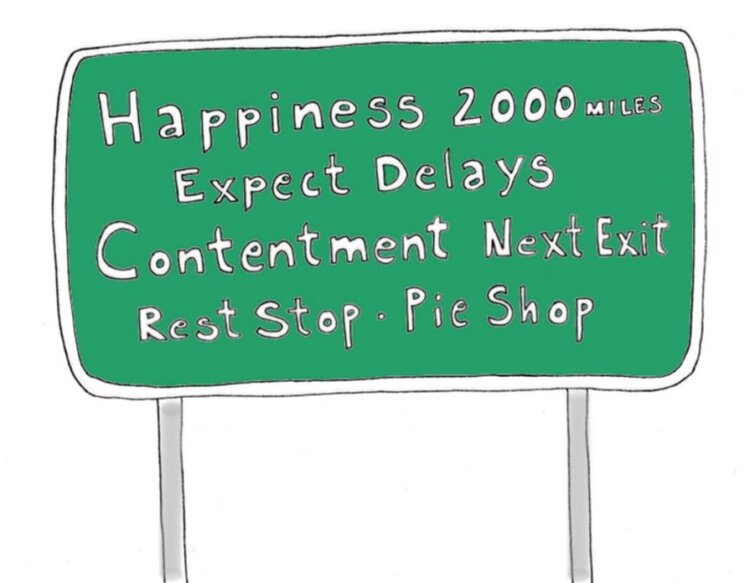
Each year, the World Happiness Report rates overall happiness levels in countries around the world. Generally, Denmark ranks very high, and this year came in as the third happiest country in the world (right behind Finland and Norway, respectively; the United States came in at 18th and falls further down the scale every year). Given Denmark’s happy status, it was a little surprising that a Danish psychologist proposed the theory that the pursuit of happiness can be downright depressing.
If we’d stop trying so hard to be happy for a moment and think about it, this makes sense. Happiness is work. First there’s reading all the books and blogs and articles on how to be happy—which subliminally imply that we are not happy. That in itself can be an upsetting idea.
Then there’s social media, with all its filter-enhanced photos of people doing amazing things, all of them wearing great outfits and just the right footwear. And their cats are cuter than yours. Knowing that these posts are the carefully curated best moments of people’s lives is akin to knowing that models in ads are PhotoShopped to perfection: We know it intellectually, but we can’t help but compare and despair, so we still feel an emotional suckerpunch.
Why has the pursuit of happiness become so much work? Are we, in fact, unhappy to start with? Are we suffering from idealized fantasies of what happiness can be? Should we all move to Denmark?
Before you start stockpiling Nordic-style sweaters, the answer is much easier than relocation and comes not from Denmark but India. It’s Santosha, the Eastern spiritual concept of contentment.
Are we suffering from idealized fantasies of what happiness can be?
The in-between of the extremes of being happy all the time and being dissatisfied with life, the idea of contentment has been largely overlooked lately. And if we want to be happier, that should change. Santosha is more readily available than happiness, almost immediately accessible. Through the process of mindfulness and being in the present, rather than an imagined, idealized future, Santosha can be found on a daily basis, even in trying circumstances.
A lot of our ideas about happiness have become laser-focused on “some day.” We’ll be happy when we get that person, that thing, get to that place, get that job, make that amount of money, and on and on. Santosha, while maybe not as glam as this fantasy some-day happiness, lets you feel the comfort of contentment in the now. Bring your attention back to today, and you can be okay with your current job, your home, your lunch. If something feels okay to you, that is Santosha, and you don’t have to wait for “some day.” Contentment can be experienced right now.
This sense of okay-ness is essentially what Danish psychologist Svend Brinkmann wrote about in his book Stand Firm: Resisting the Self-Improvement Craze. “Life is never completely okay,” Brinkmann told NBC’s Left Field. “Sometimes it’s just a little less ‘not okay.’ I think that’s realistic, but we’re not allowed to have that approach any longer… Now life has to be not just okay, but super okay all the time. And we feel if we don’t have these feelings of positivity, there must be something wrong with me.”
But there isn’t anything wrong with you. Thousands of years ago, the Buddha spoke a single truth that made everyone within earshot sigh with relief: There’s suffering in life. We can’t be happy all the time, and we don’t have to try to be. That’s still true—maybe more than ever, now that there’s this entire happiness industry that, Brinkmann says, is actually making us unhappy through constant striving. With Santosha, we can relax a little, and enjoy living in the now, with what we have and who we are.
Contentment doesn’t mean giving up on the things you want to do and have in life. Instead, this liberating concept means finding that soothing okay-ness today. Santosha offers many more opportunities for the lightness of finding contentment in parts of the job you have, in your relationships, in how you feel about yourself, in where you live, in the fact that lunch was pretty good and the tea you’re having right now is nice too.
And, in an ironic plot twist you may have seen coming, practicing contentment wherever possible, instead of going for glitter-encrusted happiness, can actually make us happier overall. If we’re practicing Santosha by inclining our minds toward what is okay in our daily lives, and releasing the need to be overjoyed over everything overall, we may become as happy as the average Dane. Nordic sweater optional.
Suzan Colón is the author of Yoga Mind: Journey Beyond the Physical, 30 Days to Enhance Your Practice and Revolutionize Your Life From the Inside Out.


Grok Nation Comment Policy
We welcome thoughtful, grokky comments—keep your negativity and spam to yourself. Please read our Comment Policy before commenting.